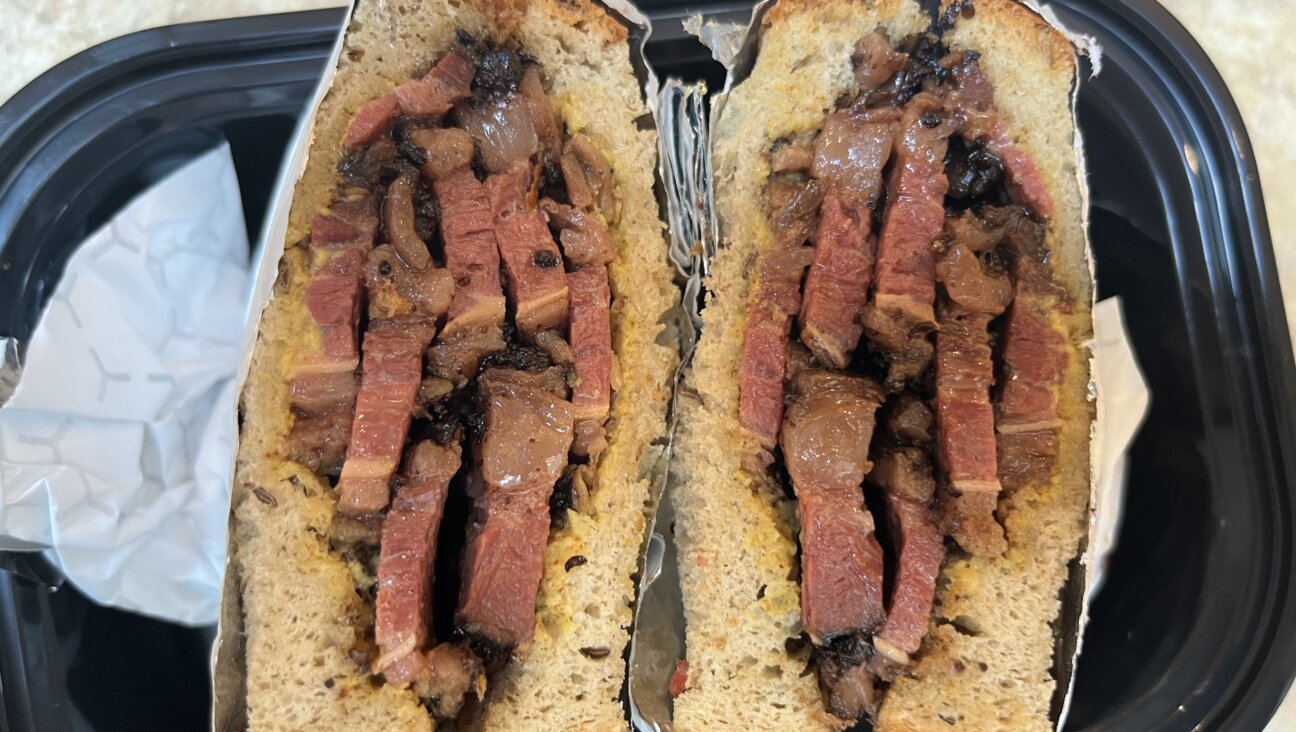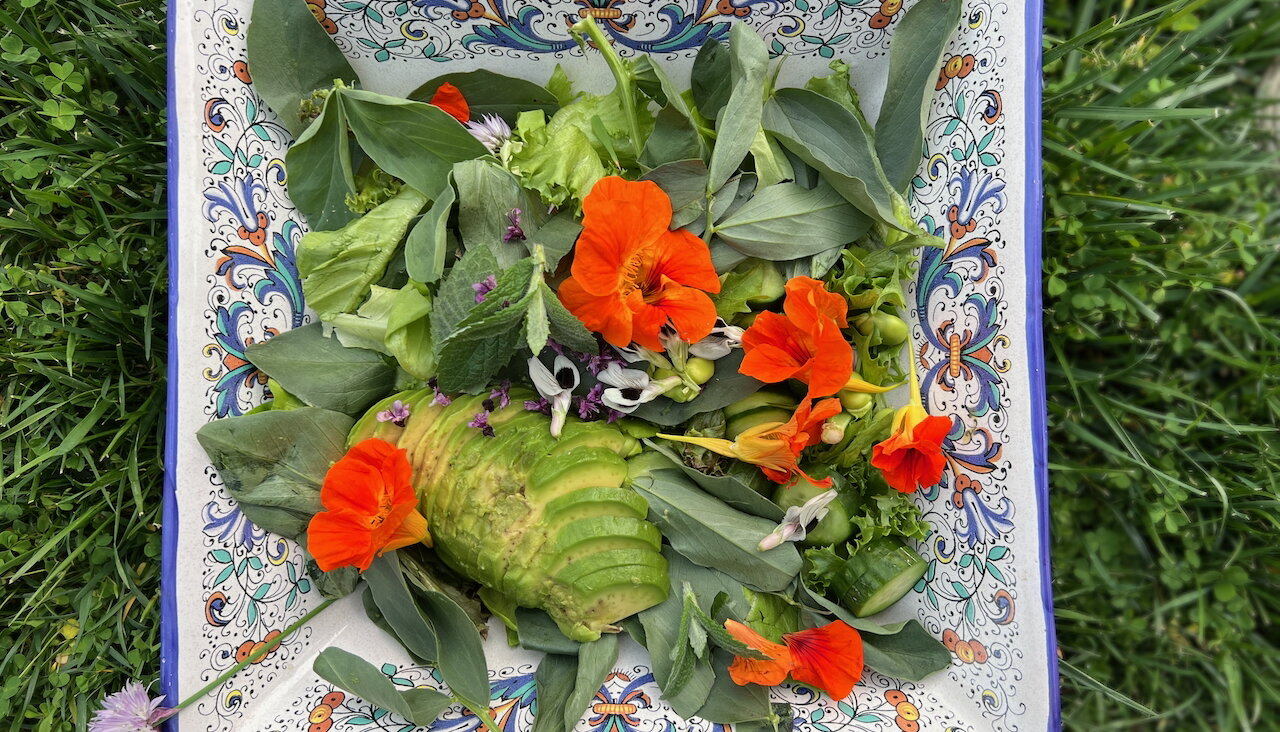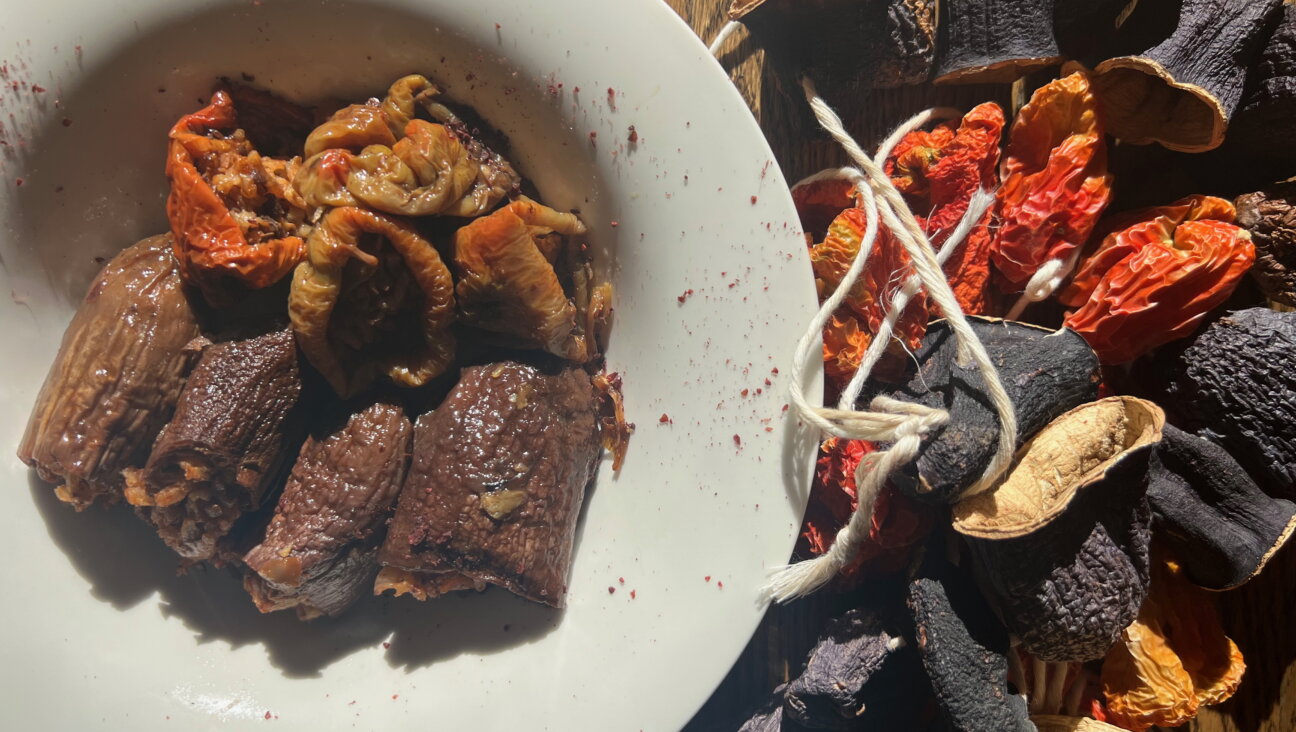Baking With the Bubbes

Image by Lisa Blobstein
Call them the baker’s dozen bakers. Well, almost.
They’re 10 or so women living at a Jewish nursing home in Montreal, neighbors on the sixth floor, who bake together most Tuesday afternoons, coaxing big, sweet aromas from a small convection oven.
“Visitors tell me they can smell [the baking] when they step off the elevator,” says Catherine Drew, a therapeutic recreation specialist, who shepherds the weekly flock of bakers at the Donald Berman Maimonides Geriatric Centre.
It’s just a short walk or wheelchair ride from their rooms to the communal dining area, where Drew, circling among the residents settles in at a long table, distributes large-print recipes and crisp white butcher’s aprons. With ingredients for chocolate chip cookies in easy reach, the women work with practiced hands, cracking eggs, measuring sugar, tipping flour.
“This brings back memories,” says Shirley Levine, 87, stirring cookie dough, having first given a play-by-play of ingredients from the command post of her wheelchair.
Resting the bowl on her lap, Levine has the sticky batter doing “The Twist” under turns of a big wooden spoon. With a final spin, it’s ready to be passed down the table and into several pairs of willing hands for shaping.
Patiently waiting for the bowl to come her way, Ann Aurlick, 101, recalls “doing a lot of baking… honey cake for a nosh when the kids came home from school.”
One by one, the women scoop spoonfuls of the batter flecked with chocolate onto pans slick with margarine. Earlier, Drew had canvassed for a volunteer “to schmear the trays”; an elderly gentlemen who’d joined in that day greased them like a car axle.
Minutes later, a small convection oven breathes hot, rising cookies out into the hallway; still warm, they disappear quickly, accompanied by apple juice and a group discussion about what to make the following week.
Drew knows she’s supervising “balabustas,” former homemakers who can teach her a thing or two about rolling pastry. So she relies on recipes familiar to any Jewish woman who ever owned a Mixmaster: blueberry muffins, apple cake, brownies.
The residents consider several options, including an iced bar cookie featured in a cookbook Drew passes around. “Too much sweetness,” says Levine. A banana cake on the next page looks good, and that settles it.
For this, they’ll need the electric mixer; Claire Goldstein does the honors with the hand-held.
“My mother was a terrific baker and I used to bake, but not like her,” says Goldstein, 84, above the buzz of beaters as she blends crushed fruit into sour cream, sugar and eggs. Done, she suggests the batter is too thick, and Drew obliges with a splash of milk.
“I used to bake rolly-poly [a filled jelly roll] with Turkish Delight and nuts. I’d ask my mother, ‘How do you know how much to put in?’, and she’d say, ‘You put in as much as it takes,’” Goldstein recalls, mimicking “shitn arayn,” the no-measure pouring method of a certain generation of intuitive cooks.
She clearly enjoys this, the alchemy of assembling sweet treats, and remembering, while they’re in the oven, her mother’s legendary pastry. A visitor swoons over the slightly crunchy banana caketops. “That’s where all the flavor is,” Goldstein advises, tucking into a second slice.
Each baker has her preferences and isn’t shy to speak up. “When they make hamantaschen, some like a filling of mon, others like jam inside,” Drew says.
“Baking gives them the feeling of being home again,” Drew continues, washing the utensils as the afternoon winds down, and arranging the clean supplies on a cart.
A mother of three who has picked up a healthy smattering of Yiddish in 12 years at Maimonides, Drew also leads residents in a coffee discussion on Fridays. And wouldn’t you know: they’ve used the old Forverts’ “Bintel Brief” advice columns. After reading a problem aloud, residents offer their counsel, and then compare it to the response in the Forverts. Like baking, there are as many solutions as variations on a recipe.
The Forward is free to read, but it isn’t free to produce

I hope you appreciated this article. Before you go, I’d like to ask you to please support the Forward.
Now more than ever, American Jews need independent news they can trust, with reporting driven by truth, not ideology. We serve you, not any ideological agenda.
At a time when other newsrooms are closing or cutting back, the Forward has removed its paywall and invested additional resources to report on the ground from Israel and around the U.S. on the impact of the war, rising antisemitism and polarized discourse.
This is a great time to support independent Jewish journalism you rely on. Make a gift today!
— Rachel Fishman Feddersen, Publisher and CEO
Support our mission to tell the Jewish story fully and fairly.
Most Popular
- 1

Fast Forward Ye debuts ‘Heil Hitler’ music video that includes a sample of a Hitler speech
- 2

Opinion It looks like Israel totally underestimated Trump
- 3

Culture Cardinals are Catholic, not Jewish — so why do they all wear yarmulkes?
- 4

Fast Forward Student suspended for ‘F— the Jews’ video defends himself on antisemitic podcast
In Case You Missed It
-

Culture How one Jewish woman fought the Nazis — and helped found a new Italian republic
-

Opinion It looks like Israel totally underestimated Trump
-

Fast Forward Betar ‘almost exclusively triggered’ former student’s detention, judge says
-

Fast Forward ‘Honey, he’s had enough of you’: Trump’s Middle East moves increasingly appear to sideline Israel
-
Shop the Forward Store
100% of profits support our journalism
Republish This Story
Please read before republishing
We’re happy to make this story available to republish for free, unless it originated with JTA, Haaretz or another publication (as indicated on the article) and as long as you follow our guidelines.
You must comply with the following:
- Credit the Forward
- Retain our pixel
- Preserve our canonical link in Google search
- Add a noindex tag in Google search
See our full guidelines for more information, and this guide for detail about canonical URLs.
To republish, copy the HTML by clicking on the yellow button to the right; it includes our tracking pixel, all paragraph styles and hyperlinks, the author byline and credit to the Forward. It does not include images; to avoid copyright violations, you must add them manually, following our guidelines. Please email us at [email protected], subject line “republish,” with any questions or to let us know what stories you’re picking up.















